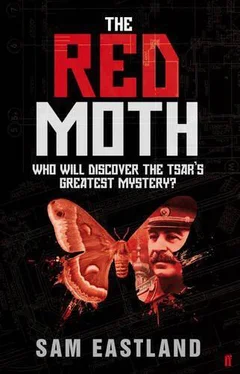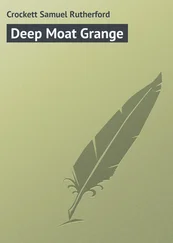Sam Eastland - Red Moth
Здесь есть возможность читать онлайн «Sam Eastland - Red Moth» весь текст электронной книги совершенно бесплатно (целиком полную версию без сокращений). В некоторых случаях можно слушать аудио, скачать через торрент в формате fb2 и присутствует краткое содержание. Жанр: Исторический детектив, на английском языке. Описание произведения, (предисловие) а так же отзывы посетителей доступны на портале библиотеки ЛибКат.
- Название:Red Moth
- Автор:
- Жанр:
- Год:неизвестен
- ISBN:нет данных
- Рейтинг книги:3 / 5. Голосов: 1
-
Избранное:Добавить в избранное
- Отзывы:
-
Ваша оценка:
- 60
- 1
- 2
- 3
- 4
- 5
Red Moth: краткое содержание, описание и аннотация
Предлагаем к чтению аннотацию, описание, краткое содержание или предисловие (зависит от того, что написал сам автор книги «Red Moth»). Если вы не нашли необходимую информацию о книге — напишите в комментариях, мы постараемся отыскать её.
Red Moth — читать онлайн бесплатно полную книгу (весь текст) целиком
Ниже представлен текст книги, разбитый по страницам. Система сохранения места последней прочитанной страницы, позволяет с удобством читать онлайн бесплатно книгу «Red Moth», без необходимости каждый раз заново искать на чём Вы остановились. Поставьте закладку, и сможете в любой момент перейти на страницу, на которой закончили чтение.
Интервал:
Закладка:
Sam Eastland
Red Moth
Russia
August 1941
A thousand feet above the Russian front
A thousand feet above the Russian front, a German scout plane weaved among the clouds, searching for a place to land. The aircraft was a Fiesler 156, whose broad wings and spindly looking wheel struts had earned it the nickname of ‘Stork’. The pilot, Hanno Kosch, was a captain in the Luftwaffe. Beside him, nervously clutching a briefcase, sat a lieutenant of the Waffen SS named Karl Hagen.
One hour before, the Stork had taken off from a forward operations base of Army Group North, just outside the town of Luga, bound for a grass strip runway near the village of Vyrista, a short distance by air to the north-east.
Kosch tilted the plane and squinted down at the ground below, searching for some contour of the earth which corresponded to the flight-plan chart clipped to a map board on his knee. ‘I don’t see it,’ he said.
‘Maybe we should turn back,’ replied Hagen, shouting to make his voice heard over the engine.
‘It’s too late,’ replied the pilot. ‘I gave you that chance half an hour ago and you refused. Now we don’t have enough fuel to return to Luga. If we can’t find the runway at Vyrista, our only chance is to set down in a field and start walking.’
The Stork shuddered as it passed through a pocket of turbulence, causing Hagen to grip the briefcase even more tightly.
‘What’s in there, anyway?’ asked Kosch.
‘Something I have to deliver.’
‘Yes, but what?’
‘If you must know, it’s a painting.’
‘You mean some priceless work of art like a Rembrandt or something?’
‘Priceless yes. Rembrandt no.’
‘Can I see it?’
‘I don’t think I can do that.’
‘Oh, come on!’ Kosch persisted. ‘Just so I can know why I’ve been risking my life for the past hour.’
Hagen considered this for a moment. ‘Well, I suppose it wouldn’t hurt to look.’ He unfastened the brass latch of the briefcase‚ removed a canvas in a small wooden frame and held it up for Kosch to see.
‘I’ll be damned,’ said Kosch. ‘What is it? A butterfly?’
‘Actually,’ replied Hagen, ‘I believe it’s a moth.’
‘It doesn’t look that special.’ Kosch shrugged. ‘But I guess I’m no lover of art.’
‘I don’t like it any more than you do,’ Hagen told him as he slipped the painting back inside the briefcase and re-fastened the latch. ‘All I want is to be rid of this thing and then I hope I never have to get inside an aeroplane again. I’m not like you. I hate flying. I didn’t sign up to be a bird.’
‘You won’t be a bird for much longer,’ Kosch told him, ‘and neither will I, with fuel enough for five more minutes in the air.’
‘How can we possibly have missed the airfield?’ demanded Hagen.
‘In these clouds, we could have missed the whole city of Berlin!’ Kosch growled with frustration. ‘It’s no use, Lieutenant. I have to start looking for a place to set us down.’ With those words, he began a gradual descent through the clouds. Raindrops speckled the Perspex canopy. Below them, the thatched roofs of a Russian village slid by, the whitewashed walls of the houses glowing warmly in the summer evening light. Spreading out from the village in all directions lay neatly planted fields of wheat, barley and rye, separated by reddish-brown dirt roads. There was no sign of people. It was the same with the other villages over which they had flown in this past hour. The entire population appeared to have vanished into thin air.
‘What is that?’ Hagen called out. ‘Down there! Look!’
Following Hagen’s gaze, Kosch glimpsed a wide expanse of manicured grass, cut through with ornate pathways. At the head of this park stood a huge building, painted blue and white, with what must have been hundreds of windows, set into gilded frames which gleamed blindingly out of the vivid green below. Another huge building, this one less ornate, stood off to one side. Other, smaller structures lay about the grounds, along with several large ponds. Kosch’s momentary fascination with the beauty of the architecture was followed by the burning of adrenalin in his guts as he realised how far they had strayed from their original course.
‘It’s beautiful,’ admitted Hagen, somewhat reluctantly. ‘I didn’t know such things existed in Russia any more. It almost looks like a palace.’
‘It is a palace!’ replied Kosch. ‘It is the old village of Tsarskoye Selo, which the Soviets now call Pushkin. All that down there was once the summer estate of Tsar Nicholas II. There is the Catherine Palace, the Alexander Palace, the Lamskie Pond and the Chinese Theatre. I learned about them in an architecture class I took at university.’
‘Now that we know where we are,’ said Hagen, ‘how close are we to where we ought to be?’
Kosch glanced down at his chart. ‘According to this map, we’re almost thirty kilometres behind the Russian lines.’
‘Thirty kilometres!’ Hagen exploded. ‘You don’t understand, Captain, this painting-’
Kosch didn’t let him finish. ‘If we come around on a north-by-north-west heading, we might be able to reach our own lines before we run out of fuel.’ Banking sharply, Kosch turned the little scout plane towards the west‚ on a course which took him directly over the vast rooftop of the Catherine Palace.
‘It looks deserted,’ said Hagen, his forehead pressed against the heavy Perspex of the side window. ‘Where did they all go?’
Suddenly the plane lurched as if it had flown into an invisible wall. This jolt was accompanied by a sound which reminded Hagen of the pebbles he used to throw by the handful at a corrugated-iron shed at the bottom of his grandfather’s garden. ‘What happened?’ he shouted. ‘What’s going on?’
Kosch did not reply. He was too busy struggling to keep the plane steady.
Bright yellow tracers, like a shower of meteors, flickered past the wings. Bullets clattered through the fuselage. In the next instant, a white stream of vaporising coolant poured from the cowling.
The firing died away as they cleared the palace grounds.
‘We must be out of range,’ Hagen said hopefully.
‘It’s too late,’ Kosch told him. ‘The damage has already been done.’
‘What do you mean? We’re still flying, aren’t we?’
‘We have to land now,’ replied Kosch, ‘before the engine catches fire. Look for a field, or a road not bordered by telegraph wires.’
‘We’re behind the lines!’
‘On the ground, we stand a chance. If we stay up here any longer, we have none.’
Seconds passed. The Stork’s engine began to sputter as the temperature gauge climbed into the red.
‘What about that?’ asked Hagen, pointing just beyond the starboard wing. ‘Is that a runway?’
Kosch peered through the blur of the glycol-smeared windscreen. ‘I think it is! It’s pretty crude, but I think I can get us down all right.’
‘Thank God,’ murmured Hagen.
Kosch laughed. ‘I thought you SS types didn’t believe in God.’
‘I’ll believe in anything that puts me safely on the ground.’
The Stork circled the airfield. At the far end of the runway stood a hangar, its roof painted dull olive green and overlaid with black amoeba-like shapes to camouflage it from above.
Kosch levelled the plane for a final approach, lowered the flaps to drop air speed, throttled back and came in for a landing.
The plane bounced once on its stilt-like legs, then settled on the ground. Silver threads of water sprayed up between the grass and tyres.
The pilot cut the engine and the Fiesler rolled to a stop with little room to spare on the short runway. As the blurred disc of the propeller stuttered to a halt. Kosch pressed his hand against the silver metal disc on his chest which connected the four seat straps, turned it to the left and then released the clips.
Читать дальшеИнтервал:
Закладка:
Похожие книги на «Red Moth»
Представляем Вашему вниманию похожие книги на «Red Moth» списком для выбора. Мы отобрали схожую по названию и смыслу литературу в надежде предоставить читателям больше вариантов отыскать новые, интересные, ещё непрочитанные произведения.
Обсуждение, отзывы о книге «Red Moth» и просто собственные мнения читателей. Оставьте ваши комментарии, напишите, что Вы думаете о произведении, его смысле или главных героях. Укажите что конкретно понравилось, а что нет, и почему Вы так считаете.











